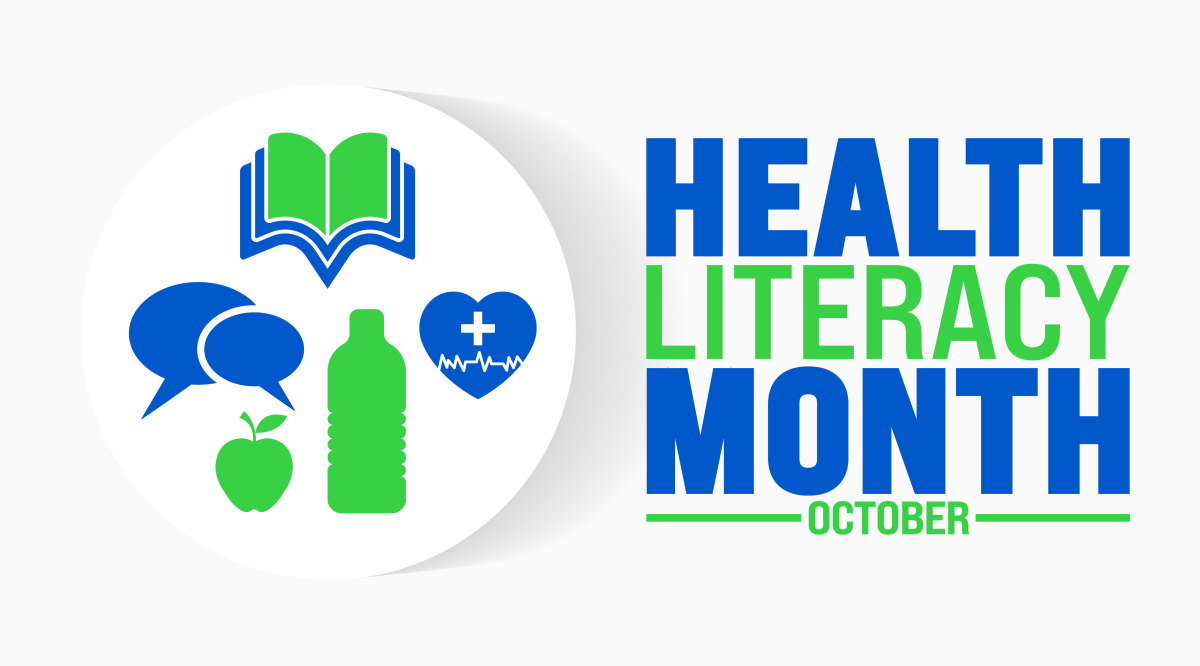Reading – a hobby, skill, necessity, and uniquely human behavior – has been taught and passed down through generations of people. To be proficient at reading, writing, and understanding is to be “literate,” and literacy is directly tied to well-being and health outcomes in our modern world.
But literacy applies to other definitions too, and having a high literacy skill as a reader does not necessarily mean being literate in other categories. One of those categories that we’re going to dive into this month is Health Literacy. Yes, once again, the month of October has given us a topic to dive into as October is health literacy month and has been since its inception in 1999.
Understanding your own health literacy proficiency and what that can mean for your well-being is a more important topic than some people may realize. In fact, health literacy is directly tied to health outcomes and quality of care that you receive when faced with health care decisions. So, for this Octobers blog, we’re going to focus on health literacy, its definition, and the two overarching areas of health literacy that the average layperson can focus on to better understand their health situations and expectations.
Personal Health Literacy
The first overarching area of health literacy is referred to as “personal health literacy.” This area of health literacy focuses on how well a layperson can find health information, understand what they’re reading/hearing, and use this knowledge to make the best-informed health-related decisions.
Improving your personal health literacy can be done by sharpening your skills in basic math and reading, but working these exercises into your life doesn’t need to be as tedious and dry as you might remember from school.
Sharpening your math skills can be done through a number of enjoyable avenues; things like sudoku, brain games, board games, card games, and more are all excellent ways of keeping up on your basic math skills, and these skills are crucial for understanding health related topics like medication dosage, nutrition labels, and test results.
Improving your reading skills can be done as easily as opening a book or magazine and giving it a read. If you’re not a big book person or regular reader, there are countless other avenues to use that will help bolster your reading skills. Games like scrabble, word searches, crossword puzzles, boggle, mad libs, and so many more will help you improve your reading skills while also letting you engage with other players and have fun.
Finally, there is a very straightforward way of improving your personal health literacy that may seem obvious, but it’s so important that I have to give it a mention – ASK QUESTIONS! If your doctor, pharmacist, or nurse is explaining health matters to you and you don’t fully understand what they’re saying, take the time to stop them and ask for clarification. With a medical language that most of us do not understand, it can be difficult to fully convey the health topics that doctors have studied for so many years, but part of their training is making this information more accessible for the layperson so that they can better understand what they’re dealing with. So, don’t be shy when speaking with your health care providers, as they want you to understand what your situation is just as much as you want to understand yourself.
Organizational Health Literacy
The other area of health literacy that we’ll discuss is “organizational health literacy.” Organizational health literacy refers to how accessible and understandable health care organizations/providers convey their information to patients. Basically, it is a term to describe how well an organization explains health information to a lay person.
A tremendous amount of work has been done toward improving organizational health literacy, as it directly ties to health outcomes for patients, and feelings of trust between patients and care providers. While there are always improvements that can be made, the current state of organizational health literacy is much improved from what it has been in the past, and with more and more awareness about health literacy in the medical world, patient outcomes are improving too.
As October wraps up, and the cold and flu season begins once more, we want you to reflect on your personal health literacy skills. Read a little more, give some basic math exercises a try, and when attending your appointments, be conscious of how your health organization conveys their words to you. Don’t be afraid to speak up when you don’t understand something and advocate for your own best care!
Health Literacy sources
